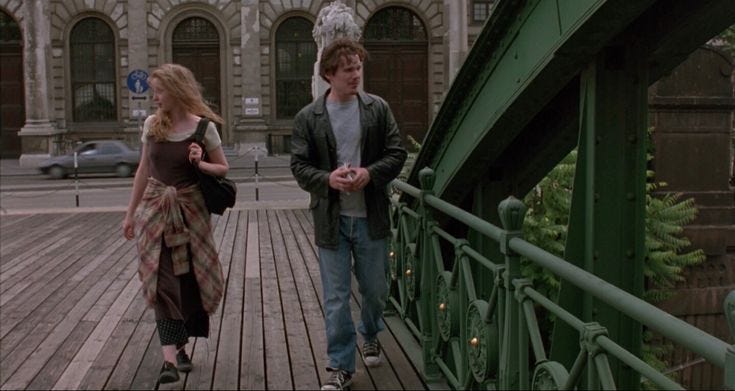The quickest way to improve your life is to start describing normal stuff with fancy foreign words. You’re not napping; you’re taking a siesta. That’s not rain you smell; it’s petrichor. Your apartment isn’t just cozy; it’s decorated in pursuit of the Danish principle of hygge. Congratulations, your life is now elevated. That’s why instead of suggesting you take a walk later tonight, I’m recommending a passeggiata.
What is a passeggiata? Well, it’s a walk—but a walk Italian style—per Merriam-Webster, “a traditional evening stroll in the central plaza by a town's residents.” It’s taking a post-prandial turn around the neighborhood, gossiping with passersby, looking at stuff, digesting your dinner, doing nothing in particular. It’s a cousin to the promenade, less productive than a constitutional, more communally oriented than a ramble. It’s like the term “sprezzatura” got up from its rattan café chair and started ambling about.
According to the Oxford English Dictionary, passeggiata made its way into English in the 1950s, likely through the writings of playwright Tennessee Williams, an expert on lethargic indulgence if there ever was one. Here is its (likely) debut in Williams’ early novel, The Roman Spring of Mrs. Stone: “The chair was always turned at such an angle that both could watch the fashionable parade of the sidewalk at that hour when Romans go for their passeggiata. It was an agreeable habit, the late afternoon passeggiata, that Americans easily fell into, so that from the barbershop one could see, at that hour, practically everyone that counted in Paolo’s world of wealth and elegant delinquency.”
As a cosmopolitan reader, you might be thinking: Wait, doesn’t English already have a loanword that glamorizes walking around? Yes, it does, but the differences between the two are instructive. The French noun “flâneur”—“an idle man-about-town,” per Merriam-Webster again—has been gracing English since 1854. Flâneurs got famous in the 19th century for being pretentious rich loafers with nothing better to do than meander about looking annoyingly handsome and indifferent. Unemployed behavior, as they say on the internet now. For a certain type, there was no higher aspiration than to be one of these proto-hipster latter-day dandies, buoyed by the condescension of the non-participant, endlessly wandering the streets of Paris.
If you think this resembles the aimless strolling above, I would remind you that there are different ways of doing nothing. The flâneur walks instead of working; the taker of a passeggiata has finished their work. They’re not wandering to new places; they’re savoring the place they live. A flâneur is someone outside society taking it in; the passeggiata is a way of existing within a community.
Consequently, there are some impediments to the contemporary American hoping to fall into the passeggiata habit back home. For example, we live in a distressingly atomised society largely without physical town squares, most of what passes for communal interaction now happens on a smartphone, and everyone’s somehow both busy and lazy. But that’s all the more reason to take your first passeggiata this evening. Be the friendly strolling stranger you wish to see in the world. Your surroundings will grow more familiar each day, and you and those around you will grow more familiar to each other. Maybe you’ll start trading neighborly nods with someone. That’s a start.
Myself, I go on two walks every day, one first thing in the morning, the second just before dinner. The first gears up my brain to start the day, the second tells me it’s time to stop striving. The morning walk is too early to be a passeggiata, but my evening walk probably isn’t one either. I’m walking like a New Yorker, or at least like an American, which is to say, way too fast and with noise-cancelling over-ear headphones blasting, like, lectures on 20th-century China. In other words, I’m still turning this time into something productive and solitary. I’d probably be happier if I went on a passeggiata instead.
The real value of these words is less to introduce you to a fresh concept than to make you reconsider how you approach what you already do, to do what you do in a better way. I may not know my neighbors, but a few blocks away someone keeps chickens in their yard. They’re kind of locally famous. At the end of the day, I like to go see them. I say, “Hello, chickens.” It makes me feel like I live somewhere. Maybe tonight I’ll at least take my headphones off when I pass by.




